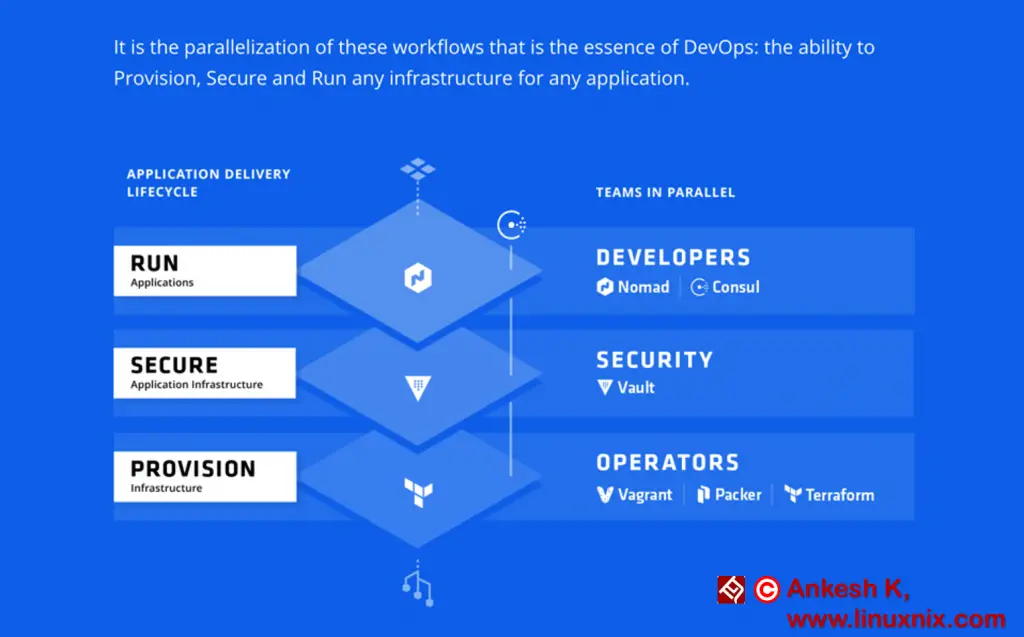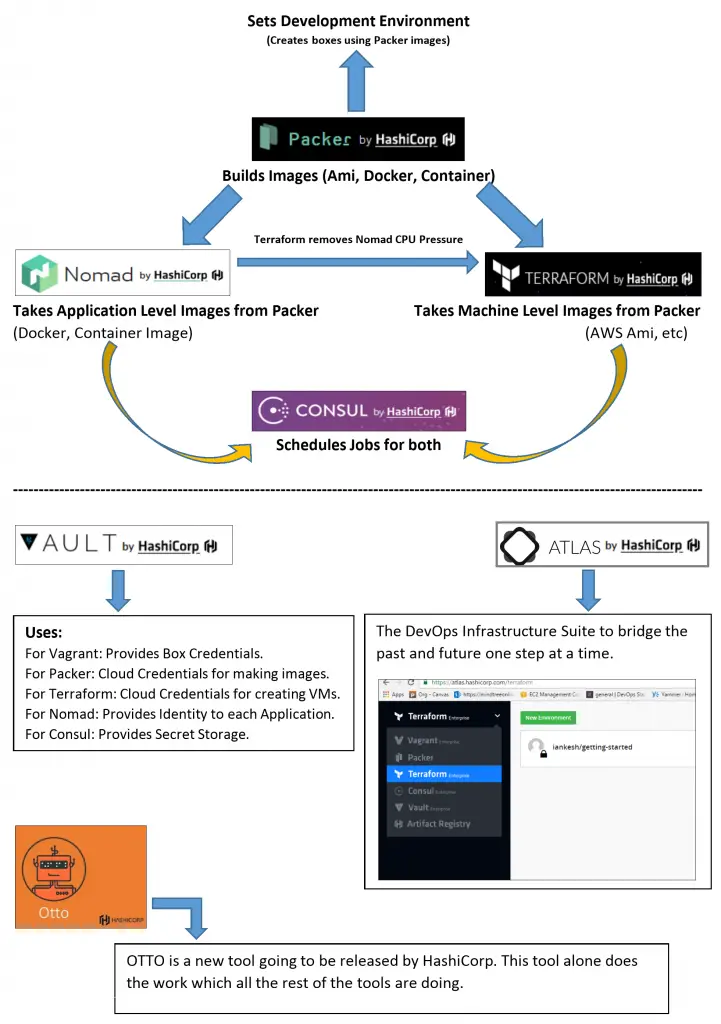INTRODUCTION TO HASHICORP
[Taken from www.hashicorp.com]

HashiCorp is a company based in San Francisco that solves development, operations, and security challenges in infrastructure so organizations can focus on business-critical tasks.
HashiCorp was founded by Mitchell Hashimoto and Armon Dadgar in 2012 with the goal of revolutionizing datacenter management: application development, delivery, and maintenance.
We will also see how they are integrated into the DevOps ecosystem. We normally don’t cover company as our aim to help technical stuff rather than some history. But HashiCorp is very different from other companies. In order to understand each tool, we should know why they developed that tool.
HashiCorp builds tools to ease these decisions by presenting solutions that span the gaps. Their tools manage AtoZ of infrastructure as code. They can manage physical and virtual machines, different OS(Windows, Linux/Unix, Mac OS), SaaS and IaaS, etc.
HashiCorp always works on awesome products and every now and then releasing something groundbreaking that we wonder how we worked without it. Now they are more focused on offering a CI workflow.
Features of HashiCorp tools
- Provision, secure and run any infrastructure for any application.
- The tools adopt a cloud-agnostic approach to create infrastructure.
- Create and configure portable infrastructure deployment code.
- Create, Plan and Run Infrastructure as Code.
- Efficiently deploy application of any type on any infrastructure.
- In enterprise tools, 24×7 support on urgent issues.
Benefits of HashiCorp tools
- Code collaboration, review with control, visibility and automated intelligence.
- Easy deployment, reduced cost, and simplified operations.
- Secures, stores and give controlled access to tokens, certificates, passwords, API-keys, etc.
- Service Discovery, Failure Detection, Multi Datacenter.
- Supports running application on any cloud, private or public.
- A declarative and human-friendly configuration file for all software.
Open source tools provided by HashiCorp
HashiCorp provides an ecosystem of open-source tools to support development and deployment of large-scale service-oriented software installations. Each tool aims at a specific part of the application lifecycle with automation in focus.
All the tools have different plugins which allow them to integrate to the other 3rd party tools. There are other premium features which are provided for only commercial use. The main products of HashiCorp are mentioned below.
VAGRANT – Development Environments Made Easy
Vagrant is an open-source tool used to build and maintain a portable virtual software development environment. For example Virtual Box, VMware, AWS, Azure, Docker Container, etc. It increases deployment productivity. It is written in Ruby language. Vagrant is considered as the quickest way to set up your local apps to test them.
PACKER – Build Automated Machine Images.
Packer is an open source tool for creating identical machine images(ex. Amazon AMI, VMware templates, OpenStack heat templates) for multiple platforms from a single source configuration. Packer does not replace configuration management like Chef or Puppet. In fact, when building images, Packer is able to use tools like Chef or Puppet to install software onto the image. Packer is considered as the quickest way to create images for machine deployments in the cloud.
TERRAFORM – Write, Plan, and Create Infrastructure as Code
Terraform is also an open-source tool to define an infrastructure in a high-level configuration language, from which it can create an execution plan to build the infrastructure such as OpenStack or in a service provider such as AWS, Microsoft Azure or Google Cloud Platform.
VAULT – A Tool for Managing Secrets
In a similar vein to Docker Secrets, Vault helps you keep sensitive information like keys, passwords, and tokens out of your production code and repositories, and instead accessible through an API.
CONSUL – Service Mesh Made Easy
Consul helps you tie together a lot of the services present in a micro-service and container-based infrastructure by providing a service they can all communicate through to discover each other.
NOMAD – Easily Deploy Applications at Any Scale
Nomad helps you schedule virtual machines (containers, VMs, and application runtimes) across multiple cloud providers and operating systems. It even handles deployment, upgrades, and machine failures.
Cloud infrastructure automation using HashiCorp

- PROVISION – Terraform
- SECURE – Vault
- RUN – Nomad
- CONNECT – Consul
All the required teams in an organization can work in parallel when adopting HashiCorp CI tools.
HASHICORP WORKFLOW
CONCLUSION
HashiCorp rarely asks you to pay for their tools. There are enterprise versions of Terraform, Vault, Consul and Nomad which provides some additional functionalities i.e. better for any organizational project. Individual HashiCorp tools are very much usable all alone, but several of them group together very well to provide an agnostic DevOps toolchain.
I will cover each of these Hashicorp tools in detail. Stay tune in to read more about Terraform Introduction in our next post.
Latest posts by Ankesh K (see all)
- Deep-Dive into Jenkins – What are all Jenkins functionalities ? - January 10, 2019
- What are different Maven Plugins and how to build a Maven project? - January 7, 2019
- What is a Maven POM File and what are different Maven Repositories? - January 3, 2019
- What is Maven and what are its benefits? - December 31, 2018
- What are the different ways to install Jenkins ? - December 27, 2018











